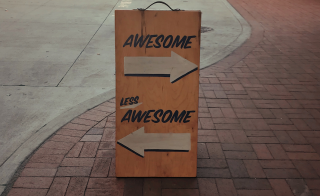I converted a research planning workshop from an in-person meeting to a remote workshop last week. Once I’d used it for a project I was working on, I felt it worked well so I thought others might find it useful too.
If you’d like to give it a try, you can follow this link to create your Mural, and then save a version of the template to use whenever you need it:
Research Planning Canvas – Mural Template
In case you haven’t got Mural, it’s available in PDF format too, and I’ve included all the reference notes contained within the Mural template below. Please Note Mural removes all borders on the PDF, so it doesn’t look amazing.
Research Planning Canvas – PDF Template

When and how to use it
When you first meet a project team who need research, this planning canvas can help you to gather all the information you need to design the best research project to meet their needs.
I designed the canvas as a remote workshop, where you facilitate the discussion and capture summaries on sticky notes. Although it hasn’t been designed as a workshop where all attendees participate, it wouldn’t take much to repurpose it.
Outline instructions for each section
Each area has instructional notes to explain the purpose and to guide your facilitation which I have also outlined below.
1. Can you give some background to the project
About the company
Give the team a chance to explain to you what they feel is most important about the company. Allow some time for this one; sometimes you can gain some vital insight you might not have got otherwise.
Core business goals
What are the bigger picture goals? Sell more? Gain more market share? Please shareholders?
You need to be able to link your research back to these goals, so make sure you don’t move off this section until you have a good understanding.
Your project/team goals
It is crucial to understand more about the project team and what their goals might be:
What is the project aiming to achieve?
How does it link to the wider business goals?
What are their individual needs from this project?
Your research must link back to these goals if it is to be successful. Pay attention here
What metrics/KPIs are important?
What do they currently measure? Can you get access to it?
If you want to have an impact, you must understand how the will measure success. If you can gain insight and access to these before you start your project, and then again after, this is incredibly useful to prove the value of your work.
2. What do we know about users?
What different types of user are there?
You need a broad view here of the different types of users they have. Look for what they know and don’t know here. How do they describe their users? Are they granular in detail or broad? How much hesitation is there here? All of this will tell you how much they really know.
What is the context of use?
Ask for detail on how users access their product or service? What situations are they typically in? Work? Home? Outside? Do they have time to focus or are they in a rush? Will they be distracted? What else is going on around them? Any detail here helps you to frame the types of interactions that take place.
What are some core Tasks/Goals
Again, this could be a whole workshop. Just focus on the high level, critical tasks users will need to perform. Try and get a sense of how much the team understand these. Are the tasks they come up with based heavily on assumption and an internal view, or are they based on good insight and previous research?
What do we know about user behaviour?
This might be in the form of analytics or reporting, based on previous research, or it might be anecdotal. Either way, gathering insight into what we actually know about how users behave is important.
You might need to give some examples here to trigger thought: Where do users drop out before completing their goal? Where do they get stuck or confused? What do we know about where they come from or go to after?
3. What do we need to know about users?
What assumptions have we been making?
It’s important for them to recognise that they may have been making assumptions about users. Some people can get a little defensive at this point so tread carefully. Anything you can get here will help you focus your research to help them make fewer assumptions in the future.
What don’t we know?
Of course, we don’t know what we don’t know. But typically teams will have an idea of things that they should know about users but don’t. Use this as an opportunity to gather a wish list for things your research could answer.
What have we been debating about?
Ask them what features or areas of the product or service they have argued or debated about before. Do different departments have different ideas? What hypotheses do they have? I like to focus on what is causing the most friction. If I can save them wasting time debating, that is a massive win for the research.
Why do we need to know these things?
Try to understand why it is important for them to understand more about their users. This is a good opportunity for you to start to sow the seed that making decisions based on evidence is much more efficient and useful than based on assumption.
4. What questions do we have?
About user attitudes
If you can start to capture hypotheses that can be really useful here. Otherwise, the main focus for this section is to understand what they really need to know about users attitudes. Is it important to them to understand people’s attitude to their brand, product, or service?
About user behaviour
Looking back at what we know about user behaviour, where are the gaps in knowledge? What do they need to know that analytics or current tools can’t tell them?
About our product/service
Is there anything specific they need to know about how people use their product or service? Are there any burning issues you must focus on? Refer them back to the project goals and ask if there is anything they would like to know to help them plan future features or to inform the product roadmap?
About how users engage for the first time
I like to add this in as some teams can get caught up thinking about existing customers. It’s important to focus them at the pre-sales and onboarding process too. What do we need to know about that experience?
5. What should the research focus on?
What areas of the product/service are most important?
Now we need to get a bit more of a narrow focus. What areas of the product or service are a priority for the research? Are there specific journeys or sections that are more important than others?
What areas are causing concern right now?
Where are they feeling the most pain? What areas would cause the most impact if they were improved? What has the eye of the board?
What is the most important thing to understand?
If you haven’t captured the essence of what they need, this is where to find out. What is the ONE thing they need from the research? Can they summarise it into one line?
What will we do differently when we know the answers?
This is perhaps the most important question of all. What will they change as a result of the research? How will the insight trigger action? Will they be able to make change? Are they open to fundamental change or just small increments? This will help you frame the research and how best to engage with this team on a longer-term basis.
6. Practical stuff
What stakeholders need to be involved?
This might need to be a separate stakeholder mapping workshop. If there is a long list of people here, then you will need to think carefully about your next steps.
Are there any methods we should consider?
I like to ask this to gain an understanding of what they think is needed. Even if you end up going against it, it can be hugely useful to gain insight into expectations and understanding of research methods.
What incentives can we offer?
When we recruit participants, what incentives can we offer to them? Raising this early can be useful as some teams may not have considered this before. It can also trigger a discussion about where you might be able to recruit people from and how easy or difficult that may be.
What dates/timeline do we need to consider?
Are there any key dates we should consider? What do we need to know about their timeline? The more insight you can gather about what they need by when, the more information you will have to plan the research to meet their needs.
I hope you find the research planning canvas useful. I’m sure there is plenty of room for refinement. Please get in touch if you spot anything.




